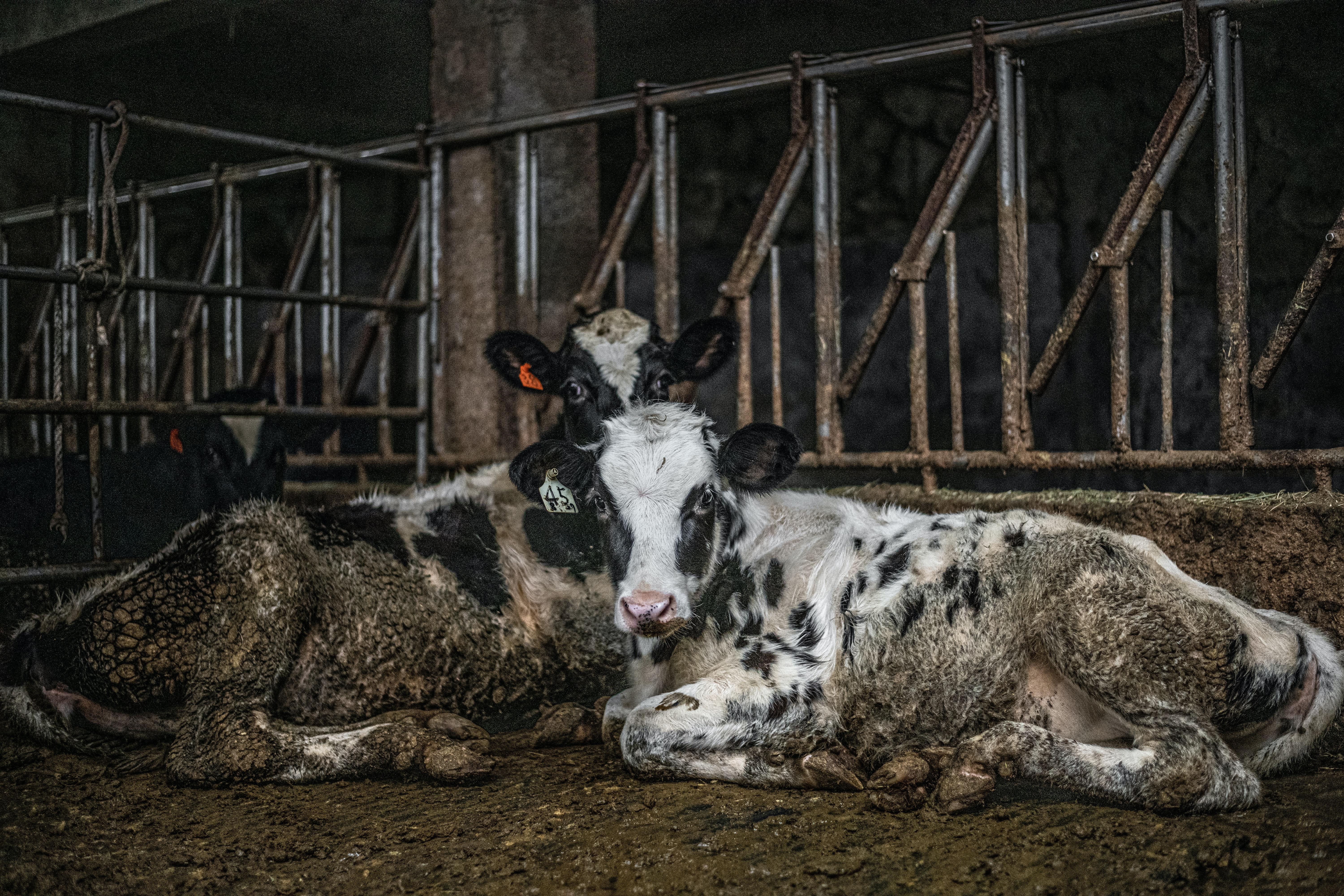
My Late Journey
I used to enjoy eating all kinds of meat, eggs and dairy products, but I never thought about whether that was ok. Four years ago I began to critically reflect on my diet after hearing philosopher Peter Singer in an interview. I was surprised by what he said, and decided to brave his book The Ethics of What We Eat, which describes the treatment of farmed animals in detail and made me extremely uncomfortable with my choices. The final straw was watching Lucent on YouTube, a documentary about Australian farms – since surpassed by Dominion. Because I was not wealthy or picky, 100% of the meat, eggs and dairy I ate came from these animals suffering in factory farms and killed in slaughterhouses. This behaviour did not at all align with my strongly held values of integrity, courage, kindness, respect, authenticity, humility, justice or non-violence.
It is infuriating that no-one in 18 years had ever pressed me to confront the harm I was causing for terrible reasons. I didn’t want to watch or think about what I needlessly chose to keep funding. I didn’t want to learn how to veganise my favourite meals or which local food chains had the best vegan options. I didn’t want to be lightly teased by family and friends. I mistakenly believed that going vegan would put my health at risk, even though the largest professional body of nutritionists in the world (ADA) have officially stated that fully vegan diets can be nutritionally adequate at all stages of life, and preventative of certain diseases. I pretended that eating vegan would be much more difficult or costly than less important habits I already had. The gravity of the issue compelled me to start investigating ethics. I desperately wish I had heard the following arguments the moment I was old enough to understand them.
Animal Suffering
It’s wrong to inflict significant suffering on others to get some small benefit for ourselves, such as lighting a cat on fire for fun. This is as uncontroversial as it gets in ethics – any plausible theory will accept it – so we can call it the minimal principle. Perhaps being a different species (or self-aware planners) permits us to slightly prioritize the well-being of members of our own species – that isn’t absurd. However, we cannot take the extreme supremacist position and violate the minimal principle in the case of farmed animals merely because they’re a different species. After all, suffering is bad primarily because of how it feels for whoever experiences it – and it feels the same for animals (including fish), because suffering doesn’t require language, life-plans or advanced self-awareness. As I show below, we are violating the minimal principle every time we eat animal products. The minimal principle therefore requires ethical veganism.
The animals we farm for food have highly complex social, mental and emotional lives. Pigs, for example, are about as social, intelligent and emotional as dogs and toddlers. Despite this, virtually all animals we eat are factory farmed. This entails selective breeding to increase output at the expense of welfare. Animals suffer various forms of extreme confinement, including immobilizing crates and cages for pigs and hens. They face unanesthetized mutilation of sensitive horns, sensitive beaks, tails, teeth and genitals. Male chicks are infanticided in macerators, gassed or crushed. All, including dairy cows and egg-laying hens, have their throats slit, many improperly stunned. The vast majority of Australian pigs are sent to slaughterhouses that put them in gas chambers. The fate of a farmed animal is usually worse than non-existence. These cost-cutting measures are exactly what you would expect from a competitive economy where animals are property and the public refuses to hear how our sausage was made.
Days of extreme suffering are inflicted on animals each time we choose the meat meal, or a single egg, over the vegetarian meal. Doing this over a lifetime is the worst thing you and I have ever done or will do, by far.
Animal Death
Many people will agree that we should minimize animal suffering, while claiming that it’s fine to painlessly slaughter animals for food – this position is called ethical omnivorism or welfarism. However, it’s very difficult to see how we could value someone’s quality of life without hesitating to needlessly take that away from them. Death is recognised as harmful in the case of happy humans and pets. Most philosophers accept the ‘deprivationist’ account of death: death is harmful because it deprives someone of a valuable future. This reveals that the killing of farmed animals is quite harmful, since chickens, pigs and calves are killed at a tiny fraction of the age they’d live to be if rescued to a sanctuary. Death being harmful doesn’t require conscious appreciation of a valuable future, since we can obviously have things of value and benefit that we fail to appreciate. Since it is obviously wrong to kill humans who are less intelligent or self-aware than farmed animals, such as infants and people with profound cognitive disabilities, we should be morally consistent by recognising that it’s also wrong to kill animals. Mere welfarism leads to even more absurdities: we should euthanize all animals to prevent suffering, since the euthenasia is unobjectionable but the suffering is problematic; we should forbid life-extending medical interventions that cause even small amounts of pain. The mere welfarist position therefore does not withstand scrutiny. It’s incoherent.
Purchases, Consumption and Complicity
Do you and I bear any moral responsibility for the horrific suffering and death in meat production? If it’s wrong to do something, it’s usually wrong to pay someone else to do it, such as murder for hire. Why is that?
First, there are excellent reasons to believe that your purchases personally cause or prevent harm to many animals. Supply chains efficiently communicate information about product demand. Animal producers operate in highly competitive environments, and your purchases have positive effects on those of other consumers. The economic pressures that require the industry to crowd, confine and mutilate animals to reduce costs also require them to be sensitive to changes in demand that they measure to the dollar. Even if the supply chain were less sensitive, perhaps only responsive to 100 people becoming ethical vegetarians, you could be the one who tips that threshold, leading to a reduction 100 times larger than your share. This is unlikely: it’s 1% likely that you will cause a reduction of 100 people’s worth, but combining those figures (1% x 100) makes it ethically equivalent to having a 100% chance of causing a reduction of 1 person’s share. This outcome holds for any numerator and denominator: no matter how (in)sensitive you believe the market is, your expected impact is ethically equivalent to guaranteed reduction of your share. Your share is not small: it’s 3 meals a day every day for, let’s guess, another 70 years. This is over 75,000 meals, and I’ve found it useful to picture that all coming into effect at once as the result of a lifelong commitment to supremacism or non-violence.
Second, it is wrong to co-operate or participate in wrongdoing, or intentionally making it so that very unethical things are done for your sake – and an action does not need to be impactful to be ethically required or prohibited. It is wrong to intentionally benefit from a job opening in a firing squad, for example, because firing squads have wrongful plans and it is typically wrong to aim to benefit by cooperating with the wrongful elements of others’ plans, especially when being uncooperative does not impose a severe burden. This is the principle of anti-complicity. The extremely wrongful plan of the animal industries to profit from large scale confinement and slaughter forces us to be complicit in the atrocity or become vegan.
I highly recommend:
- Watching Dominion on YouTube
- Trying a vegetarian or vegan diet for 3 weeks to see what you think
- Joining the UQ Veg Society
- Clicking here for further information, references and recommended reading
Bibliography
- https://pubmed.ncbi.nlm.nih.gov/27886704/
- Harman, G. The Nature of Morality: An Introduction Ch 1: Ethics and Observation
- Rachels, J. The Basic Argument for Vegetarianism; DeGrazia, D. Moral Vegetarianism from a Very Broad Basis
- Stanford Encyclopedia of Philosophy: The Moral Status of Animals
- King, B.J., 2017. Personalities on the plate: The lives and minds of animals we eat.
- HSUS Welfare Reports: Impacts on Farmed Animals [the animal protection index gives us the same grade as the US]
- Saja, K., 2013. The moral footprint of animal products
- https://philarchive.org/archive/MCPWIA-3
- https://philpapers.org/rec/HUEDOE-2
- https://plato.stanford.edu/entries/vegetarianism/#ProdCons
- https://philpapers.org/archive/MCMAIO.pdf
- https://philarchive.org/archive/MCPWIA-3
Views: 341
